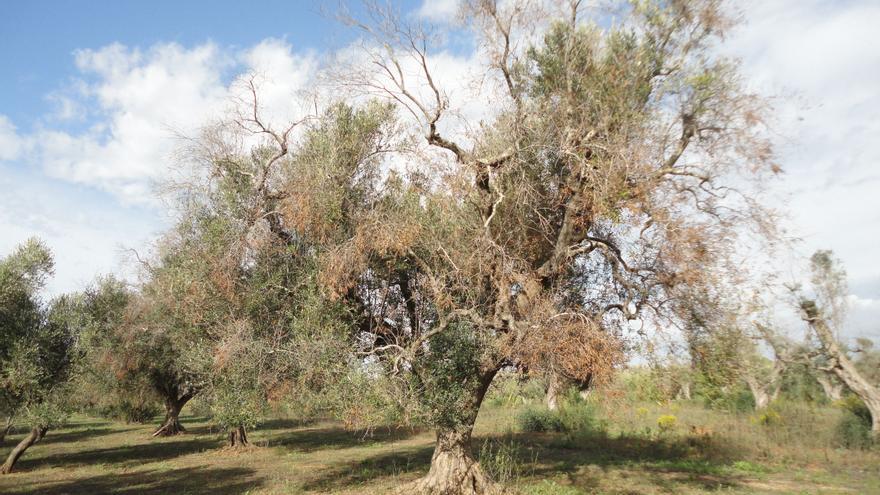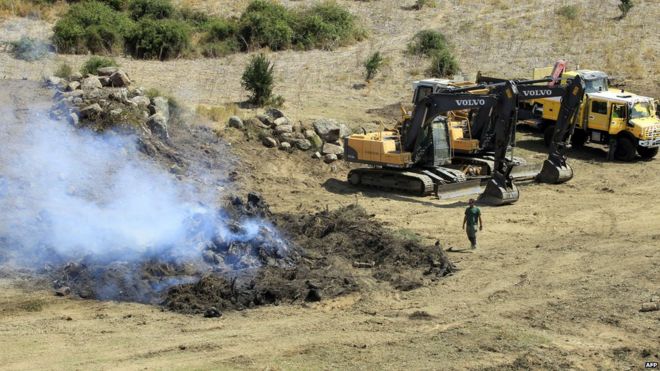A SERIOUS PHYTOSANITARY
CRISIS: XYLELLA FASTIDIOSA
José Miguel
Mulet is a professor of biotechnology at the University of Valencia in Spain, and
he is also a great scourge of misconceptions about agriculture and food. He
gives numerous lectures and has written several books, the most famous of which
is "Comer sin miedo" (eating without fear).
He also runs
a Spanish blog http://jmmulet.naukas.com/
In the
following article he tells us the true and edifying story of the spread of one
of the worst sanitary crises in cultivated plants, probably comparable to the phylloxera
crisis on the vineyard in the 19th century.
The olive
tree is currently in an unprecedented risk situation for an extremely serious
phytosanitary problem. It is a bacterium of which a very virulent strain began
to spread in 2013 from southern Italy and is rapidly advancing towards the rest
of Europe, provoking the death of millions of trees on his way.
Despite
the work of scientists and a European plan to contain outbreaks of the
epidemic, the Xylella fastidiosa bacterium
is currently out of control in Italy.
Since 2015,
the bacterium has been detected in France, first on the island of Corsica and
then on the mainland, in Provence.
Since 2016,
it has also been detected in Spain, first in the Balearic Islands, and more
recently in the Alicante region.
The French
and Spanish attacks are currently under control, but no one today, is able to predict the evolution of the epidemic.
Unfortunately, all European olive
trees can be attacked and annihilated in a few years if a solution is not
quickly found.
Observation
of infections shows that some varieties are extremely sensitive and others
appear to be more tolerant. There lies the hope of saving the species, and of
being able to remake plantations where the bacterium will have killed the olive
trees of the sensitive varieties.
Research is
working hard to find a solution to at least stabilize the epidemic, but it must
be acknowledged that today we are faced with a dead end.
And
thousands olive trees die every day thousands in Italy.
France and
Spain have chosen to confine the spots thanks to preventive grubbing-up, hoping
that these measures will be sufficient.
But how was it possible to get to
this disaster?
It is where
this drama of still imprecise dimensions becomes a study case.
Here is the
complete text, only reduced of some of JM Mulet's comments, which I don't share
the tone, even though I agree with the substance, and which don't contribute
anything to the story itself.
"A few weeks ago we got the
bad news of the detection of the first infections of Xylella fastidiosa in the
peninsula, specifically in Guadalest (Alicante). It had arrived in Majorca at
the end of 2016. This bacterium, known as the "olive Ebola",
obstructs vessels through which the sap flows and the dry plant, affected by
Pierce's disease. The bacterium spreads from tree to tree using insects as
vectors.
Xylella is endemic to America. It
was first identified in California where, periodically, it attacks vineyards.
Other varieties of the bacteria can attack lemon trees, peach trees, laurels.
It is one of the most feared plant pathogens, which is therefore periodically
monitored, and its appearance is monitored in all plant protection centers.
The problem was detected in Italy,
specifically in Apulia, in 2013. To situate us on the map, if Italy has the
shape of a boot, Apulia is its heel.
Automatically scientists alert on
the seriousness of the problem and the European Commission draws up a plan called Silletti plan to contain the
epidemic. At present there is no effective treatment against Xylella, so
the only solution is to eliminate all trees within a 100-meter radius around
the infection site to prevent the insect from transmitting the disease from
tree to tree. The European Union releases a budget to implement this plan and
continue monitoring. Rapid and early
action is the best solution to a crisis of this type.
And that's where the problem lies.
Rumors quickly begin to appear. Farmers' groups question that Xylella is the
cause of the disease and oppose the felling of trees. Some accuse of the
disease, a fungus that can be destroyed without killing the olive trees, others
claim that Xylella is easily controllable. Meanwhile scientists determine that
the cause of the disease is a very virulent strain of Xylella imported by an
ornamental plant from Costa Rica. In parallel, opposition to the Silletti plan
is developing, orchestrated, of course, by groups of organic and biodynamic
agriculture (...). They suggest that Xylella is part of the ecosystem and that
the solution is to do nothing, in order to integrate it, and to use natural
fertilizers.
No, I don't invent it. You can read
here the proposals they make to curb the Xylella (http://xylellareport.it/2015/08/30/who-we-are/).
Some even call for violent action
against this plan (http://xylellacodiro.blogspot.com.es/2016/06/eu-court-of-justice-confirms-xylella.html).
Picture: http://i.dailymail.co.uk/i/pix/2015/04/14/01/278910E500000578-0-image-a-12_1428971890691.jpg
The opposition begins to organize
and becomes stronger. It convinces politicians and judges. By a surprising and
indignant turnaround, ecologists not only succeed in curbing the plan, but they
also accuse scientists of having intentionally spread the disease. The
prosecutor presents criminal charges against Donato Boscia, of the Institute of
Sustainable Vegetal Protection of Bari. According to them, this is a strain
introduced for a workshop on Xylella in the Institute itself. The fact that
this strain is not that of the disease and does not affect the olive trees
seems to have been insufficient. The judge continues the trial and orders a
search of the research institute, which had issued the alert, requisitioning
computers and research equipment, and curiously curtailing the work of the most
qualified scientists to fight the disease.
The outcome of judicial action,
paralysis of the shock plan and agroecological techniques of disease control,
was that the epidemic spread throughout southern Italy affecting millions of
olive trees and 235,000 hectares, and that the disease extended to the Balearic
Islands and Guadalest.
Let's hope that our authority knows
how to take an example of the Italian catastrophe and won't try to minimize the
problem with agroecological techniques. A long time ago, we saw how the
phylloxera wiped out the vines, and more recently how the red palm weevil
exterminated the palm trees. If we don't urgently start a shock plan, we will
have to get used to soybean or sunflower oil, or olive oil from California or
South Africa."
This is a
very interesting case for the course of events. It clearly shows the risks of
ideologizing politics and justice in democracy.
This is an
increasing trend in the most industrialized countries, where groups of all
kinds develop conspiracy theories, take power through social networks, and
manipulate opinion by this same bias.
There is
trendy to think that Science sold itself to the multinationals and that these
ones seek to dominate the world, to control the food of the planet.
And if the
authorities, whether political, police or judicial, don't know how to make the
difference, we can arrive at disasters of frightening dimensions.
This is
unfortunately the case of this phytosanitary crisis, the consequences of which
are likely to be very serious, economically, socially and environmentally.
And we come
to this kind of absurdity, which would be laughable if it were not so serious.
Because if
you count, between grubbing up, cleaning up, buying of plants, replanting and
maintenance up to adulthood, it's at least € 40,000 ($ 50,000) per hectare that
must be counted so that these surfaces are again productive in olive oil, not
counting the ten years that it will be necessary to wait for the trees grow.
Make the count: 235,000 hectares x 40,000 euros, we are talking about more or
less 10 billion euros (12 billion dollars) ... until now!!!
And all
that, taking into account only the agricultural damage, and assuming that it is
possible to replant olive tree soon after the infestation by this bacterium,
something that is far from certain.
To that,
must be added all bankrupt olive oil structures, packing industries, logistics
companies, and the thousands of jobs lost, and I surely forget some. This
second total is probably close to the first one.
Who will
charge with this terrible damage?
Who is
responsible for this disaster before the law and before civil society?
And the
culprits of the loss of control of this epidemic, whether unconscious
agriculturists, environmental activists, politicians or judges, will they be
punished for this crime?
Picture: http://www.lavoroediritti.com/wp-content/uploads/2015/10/sentenze-cassazione-e1445437346611.jpg
To
learn more:









Boutique en ligne d'huile d'olive
RépondreSupprimerNous livrons partout dans le monde
Trouvez la meilleure huile d'olive méditerranéenne, l'huile d'olive extra vierge et l'huile d'olive biologique naturelle.
Visitez notre boutique en ligne!
http://aceite-oliva.online
#OliveOil #BestOliveOil #OnlineOliveOil #Italie #Grèce #Espagne #HealthyFood #Méditerranéenne